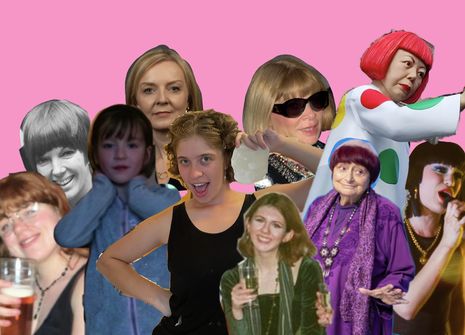Why the bob keeps coming back
Emily Lawson-Todd takes a look at why this classic hairstyle is once again all the rage

Maybe there’s a mild existential crisis that comes with entering third year, because over the past week no fewer than three of my friends have started sporting bob haircuts. Suddenly, claw clips have been abandoned en masse as everyone around me seems to be embracing the shorter look.
My first thought as to why those I held near and dear had begun to channel their inner Edna Mode was - I admit with shame - that they’d all had a collective meltdown. A big, drastic haircut often points to the desire for change, which usually means there’s been a crisis. On second thought, I probably drew this conclusion because I’d just finished binge-watching Fleabag and the iconic line “Claire, it’s French” was reverberating around my mind. Oh, and I was definitely projecting my own DIY-fringe failure from first year (pictures not included for my dignity) as well.
“Short hair symbolised a new, freer, more fun fashion for women”
Yet even before Claire from Fleabag (and indeed, my friends) decided to embrace the short hair look, the bob has been kicking around and dividing people for over a century. Though it had been a mainstay of courtly knights and renaissance nobles for much longer, the bob first made waves in the fashion world in around the 1920s, when flapper-chic was all the rage. Short hair symbolised a new, freer, more fun fashion for women - so naturally many hairstylists refused to cut it. Yet the look persisted, bobbing (sorry!) through the rest of the 20th century as a haircut associated with youthfulness and sophistication.
Today, the bob is chic. The bob says “I have my life together, thank you very much. Now if you’ll excuse me I need to go to my six society meetings and also get a first because I am much more put together than you”. The bob, especially in its most sleek and cropped iteration screams “I may look very low-effort, but trust me, I am the result of hours spent straightening and styling”. No wonder it’s the go-to haircut for so many girlbosses. Anna Wintour, arguably the most famous modern bob-sporter, has been rocking the cropped cut for at least half a century now, which is exactly the sort of commitment to the bit that you’d expect from someone who has a bob.
The hair equivalent of eighties shoulder pads, the bob exists in the liminal space between frivolity and formality, sophistication and camp. The bob is just as likely to be the haircut of choice for Tory politicians (see Theresa May and Liz Truss both adopting the bob as part of their Thatcher cosplays) as it is for rebellious artsy types like Agnes Varda and Yayoi Kusama.
“The bob exists in the liminal space between frivolity and formality, sophistication and camp”
Yet in all of this, the bob is ultimately a haircut that symbolises reinvention. It’s a large commitment and a bold statement. Above all, as seen from its various cultural perceptions, it’s pretty darn versatile. A blunt bob with a thick fringe, a curly bob clipped with barrette clips, an ‘Alice from Twilight’ early 00s spiky affair - the possibilities are endless. In this way, the bob is sort of the perfect Michaelmas haircut; it both serves as a fun way of shaking your look up, whilst also being classy and sophisticated enough to provide you with the semblance of being someone who is put together, regardless of what your essay feedback might tell you. It’s easy to slick back after a night out, making greasy roots look intentional as opposed to the consequence of spending a night in a crowded smoking area being shoved into various people’s armpits. And regardless of what hairdressers might tell you, it’s pretty DIY-able – though not if you want it to look symmetrical or indeed good.
Will we be seeing more and more bobs around Cambridge as the winter months roll in? Should we all start binning our claw clips? Only time will tell. All I really know is that the bob in all its various forms isn’t going anywhere anytime soon. After all, there will always be girlbosses and twenty-somethings going through existential crises.
 News / Clare Hall spent over £500k opposing busway 24 December 2025
News / Clare Hall spent over £500k opposing busway 24 December 2025 Comment / The ‘class’ of Cambridge24 December 2025
Comment / The ‘class’ of Cambridge24 December 2025 News / Caius mourns its tree-mendous loss23 December 2025
News / Caius mourns its tree-mendous loss23 December 2025 News / Girton JCR publishes open letter expressing solidarity with Palestine25 December 2025
News / Girton JCR publishes open letter expressing solidarity with Palestine25 December 2025 Comment / Yes, I’m brown – but I have more important things to say22 December 2025
Comment / Yes, I’m brown – but I have more important things to say22 December 2025










